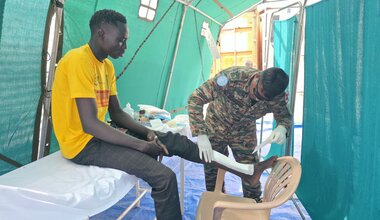Human rights chief meets opposition forces leader
29 April 2014 - UN High Commissioner for Human Rights Navi Pillay met with former Vice President Riek Machar at an undisclosed location today.
“I’ve just come back… from a meeting Riek Machar, together with Adama Dieng (UN Special Envoy for the Prevention of Genocide)…” she said on her return to national capital Juba. “We landed, went to a little village and met him under a tree.”
Ms. Pillay described the 35-minute meeting, during which Dr. Machar had a stack of books in front of him, including one about a failed state, as a “good” one.
“(We) gave him the concerns of the Secretary-General’s concerns about protection of civilians,” she said. “We received assurances from him that he himself is investigating human rights violations that occurred in (the Unity State capital) Bentiu and is also concerned about the protection of civilians here.”
The human rights chief noted that Dr. Machar had said he “found it difficult to be in the situation where he is”.
“I welcome the fact that he is thinking in terms of a political solution to the problem,” she said. “He wants to be assured that the President of South Sudan will keep to his word and then they could resume the Cessation of Hostilities Agreement.”
Mr. Dieng, who along with Ms. Pillay also met with displaced people at the UNMISS base in the Jonglei State capital Bor, said it was extremely shocking to see how traumatized most of them were.
“We did draw the attention of Dr. Machar that we hope that he will really call to order his commanders in the field, those who are overseeing attacks,” he said. “We made it very clear that it is important to remember that in most of the armed conflict in Africa, those who did not listen to the call to cease hostilities ... ended before the courts.”
The Special Envoy for the Prevention of Genocide said he had mentioned the cases of (Liberian former president) Charles Taylor and (Sierra Leonean warlord) Foday Sankoh specifically.
“I mentioned to him that accountability (needs to) be addressed,” said Mr. Dieng. “He did mention that he is investigating his own people, but at the end of the day, what is critical is that the hostilities have to be ceased and that both leaders come together so that the people of … South Sudan won’t be betrayed.”
Mr. Dieng said that opening UNMISS gates to civilians seeking protection was a first in history and a vital decision taken to make sure that what happened in Rwanda 20 years ago would not happen in South Sudan.
 UN
UN United Nations Peacekeeping
United Nations Peacekeeping





